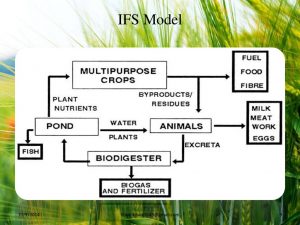W.B.C.S. Notes On – Integrated Farming System(IFS) – Agriculture Notes.
Integrated farming System (IFS): Integrated Farming System (IFS) is an interdependent, interrelated often interlocking production systems based on few crops, animals and related subsidiary enterprises in such a way that maximize the utilization of nutrients of each system and minimize the negative effect of these enterprises on environment.Continue Reading W.B.C.S. Notes On – Integrated Farming System(IFS) – Agriculture Notes.
The interrelated, inter-dependent-interlocking nature of IFS involves the utilization of primary produce and secondary produce of one system, as basic input of the other system, thus making them mutually integrated as one whole unit.
Integrated Farming – UNI 11233-2009 new European agriculture organic standard (IF), integrated production or Integrated Farm Management is a whole farm management system which aims to deliver more sustainable agriculture. It is a dynamic approach which can be applied to any farming system around the world. It involves attention to detail and continuous improvement in all areas of a farming business through informed management processes. Integrated Farming combines the best of modern tools and technologies with traditional practices according to a given site and situation. In simple words, it means using many ways of cultivation in a small space or land.
It can help in tackling the farmer’s distress as it focuses on the following –
- Utilizing the by-products of one component of the farming system as an input in other for ensuring supplementary and complementary enterprise relationship. Thus reducing the effective input cost. For example, cattle dung mixed with crop residues and farm waste can be converted in to nutrient-rich vermicompost.
- Maximization of yield of all component enterprises to provide steady and stable income at higher levels.
- Rejuvenation/amelioration of systems productivity and achieve agro ecological equilibrium.
- Control the built-up of insects-pest, diseases and weeds population through natural cropping system management and keep them at low level of intensity.
- Reducing the use of chemical fertilizer and other harmful agrochemicals and pesticides to provide pollution free, healthy produce and environment to the society at large.
- Increase in natural resource use efficiency by early recycling of nutrients.
- Some IFS features like Organic farming, and developing a judicious mix of income-generating activities such as dairy, poultry, fishery, goat-rearing, vermicomposting and others, and community-led local systems for water conservation etc help in reducing farmers’ distress.
- Mitigation of negative impact of agriculture or livestock on environment.
- Effective tool for north eastern farmers: Integrated Farming Systems suitable particularly for hilly regions of the North Eastern Region can be adopted. Some are as – Integrated Fish cum Pig farming, Integrated Fish cum Duck Farming, Integrated Fish Farming-Chicken, Integrated Fish farming-cum-Cattle farming, Integrated Fish farming-cum-Rabbit farming, Integrated Fish farming-cum-Agriculture. Sikkim being an organic state is an good example.
- In its real sense it will help in lifting the economy of agriculture and standard of living of the farmers of the country as a whole.
- All stakeholders should make continuous efforts to build farmer capacities for adoption of productive, remunerative, eco-friendly and self-sustaining integrated farming systems.
Please subscribe here to get all future updates on this post/page/category/website


 Toll Free 1800 572 9282
Toll Free 1800 572 9282  mailus@wbcsmadeeasy.in
mailus@wbcsmadeeasy.in



















































































































